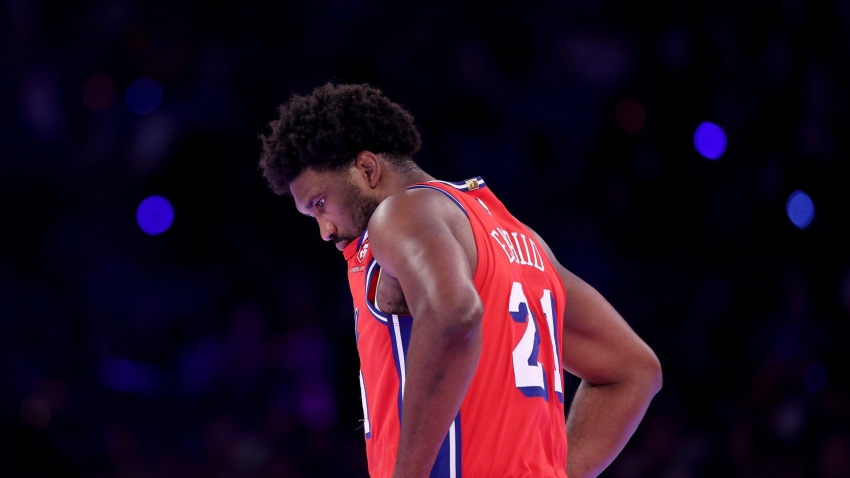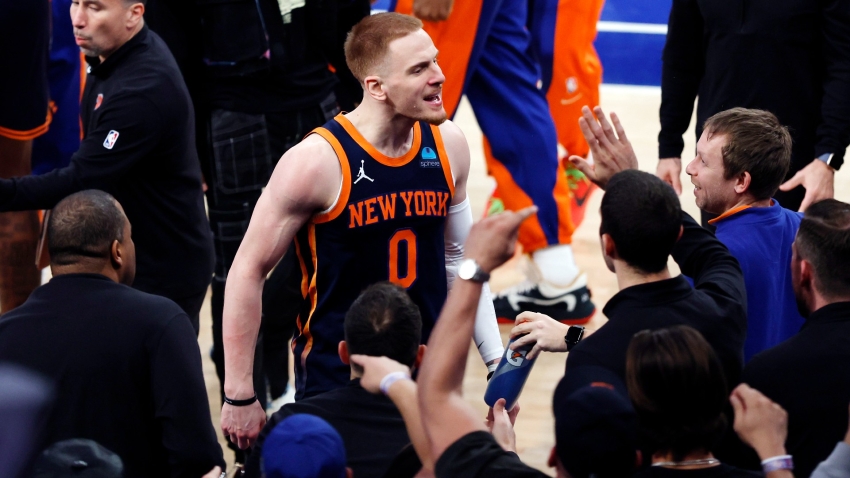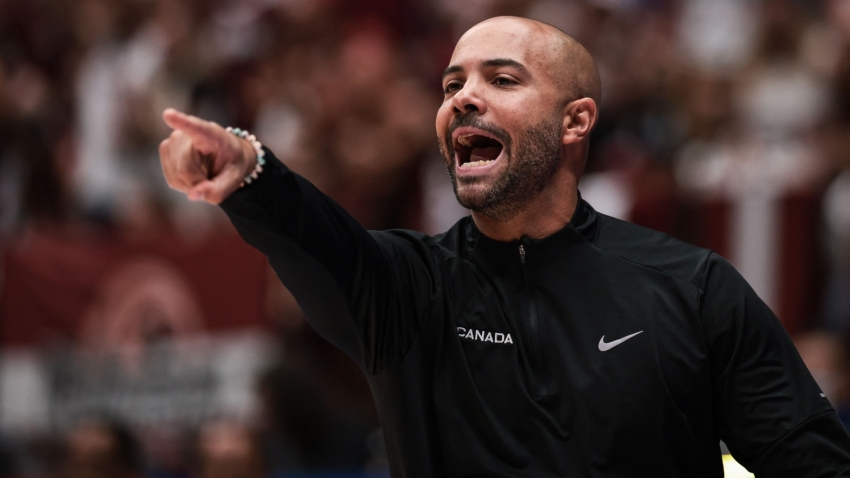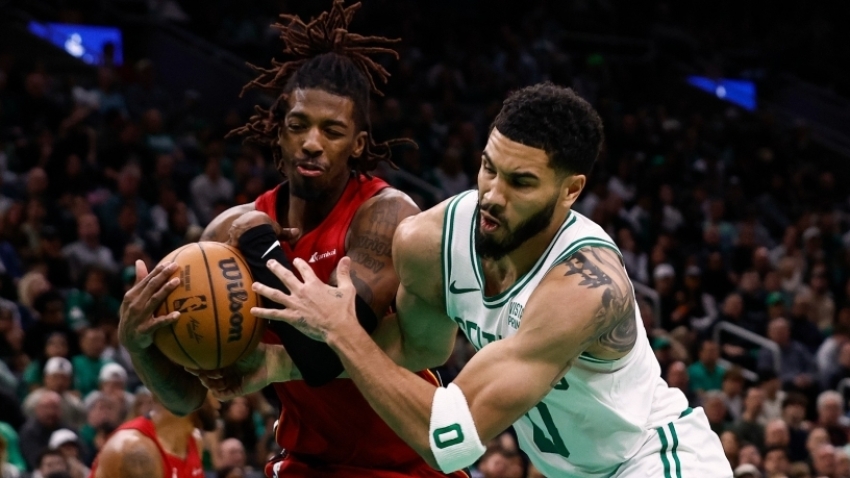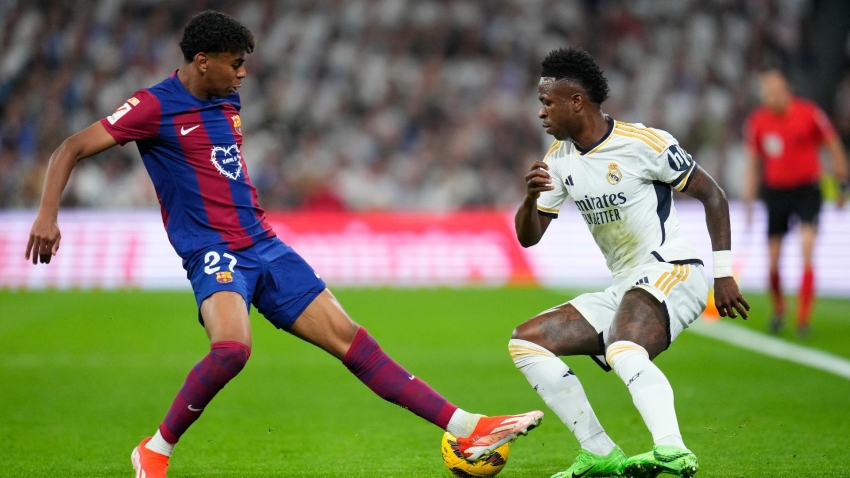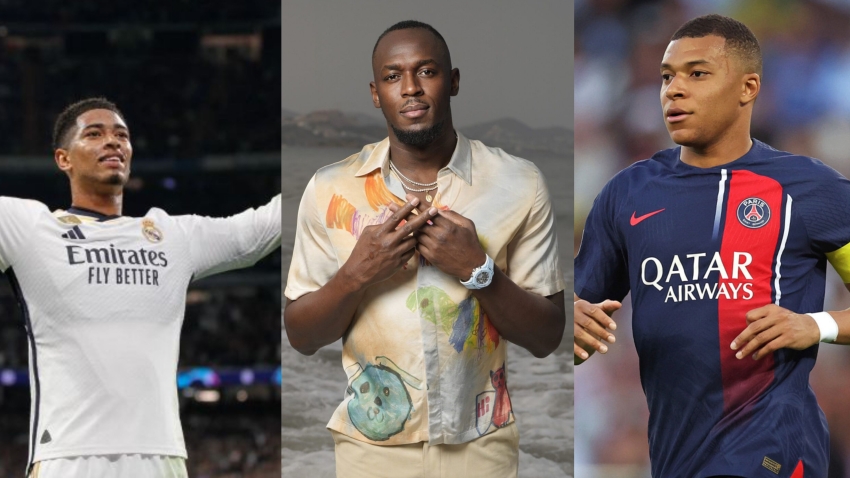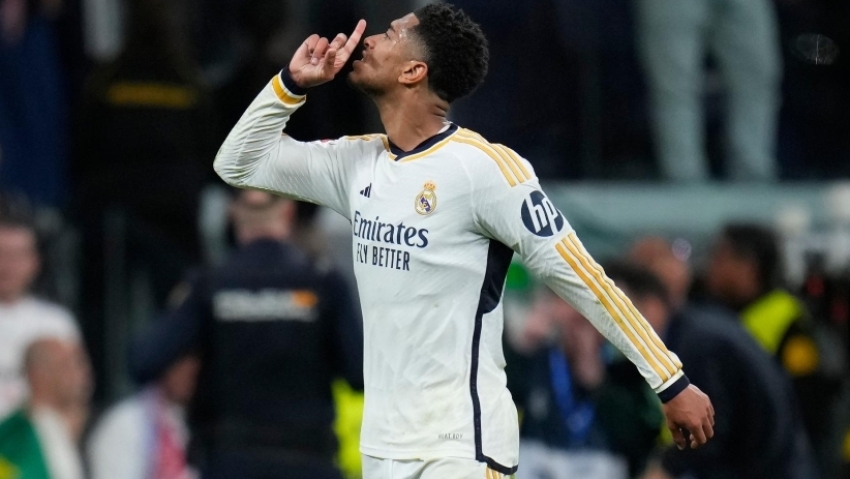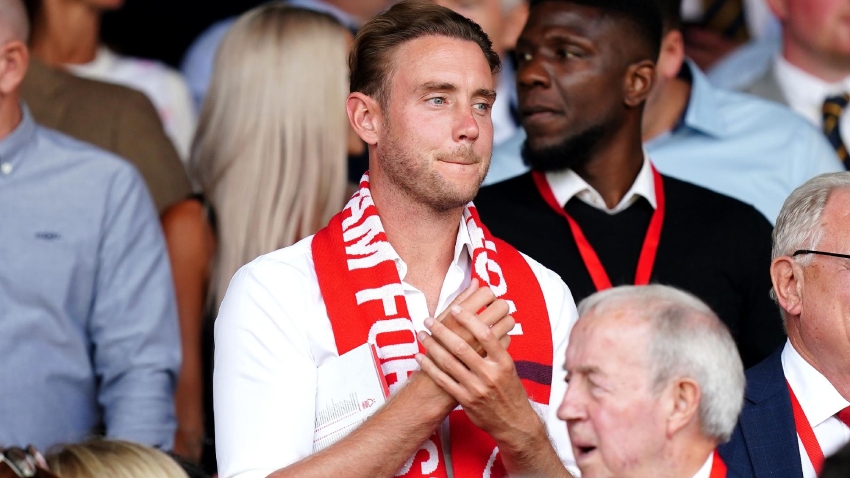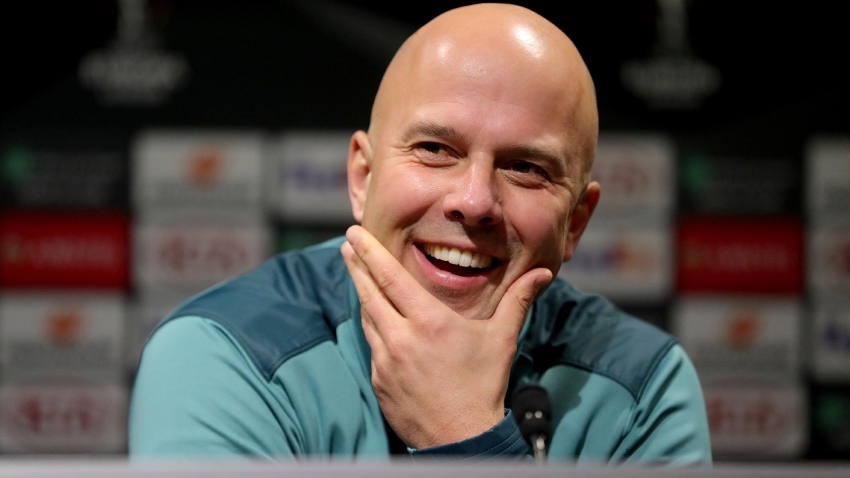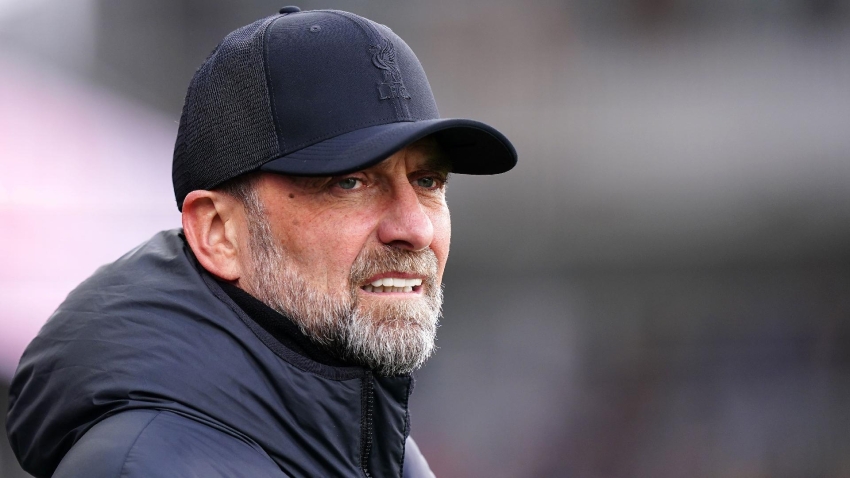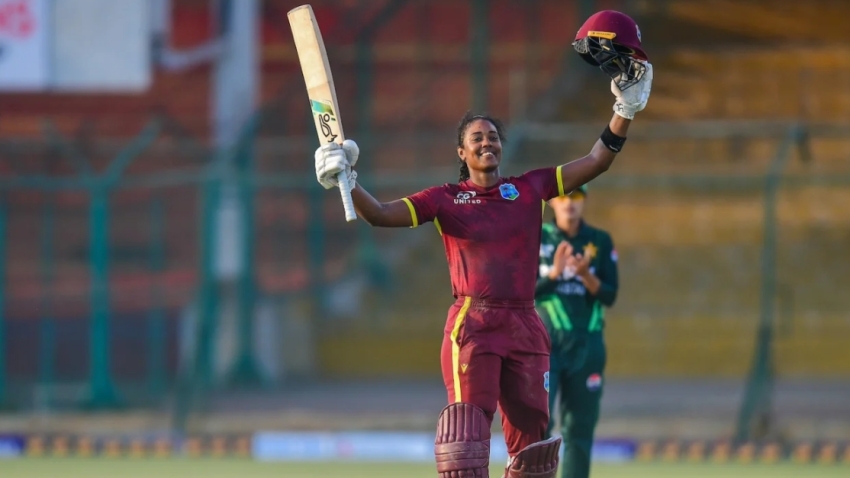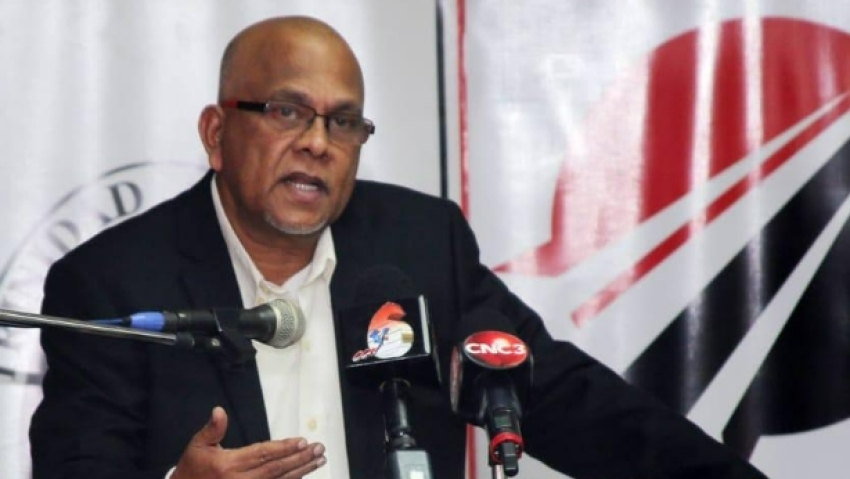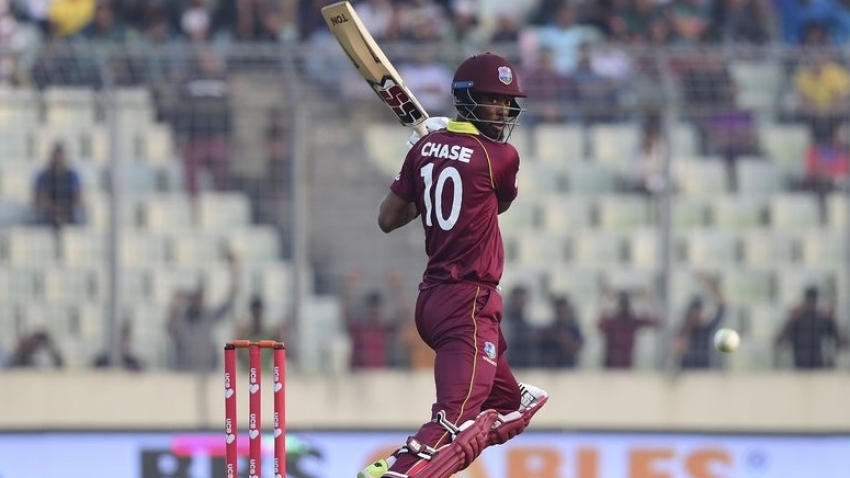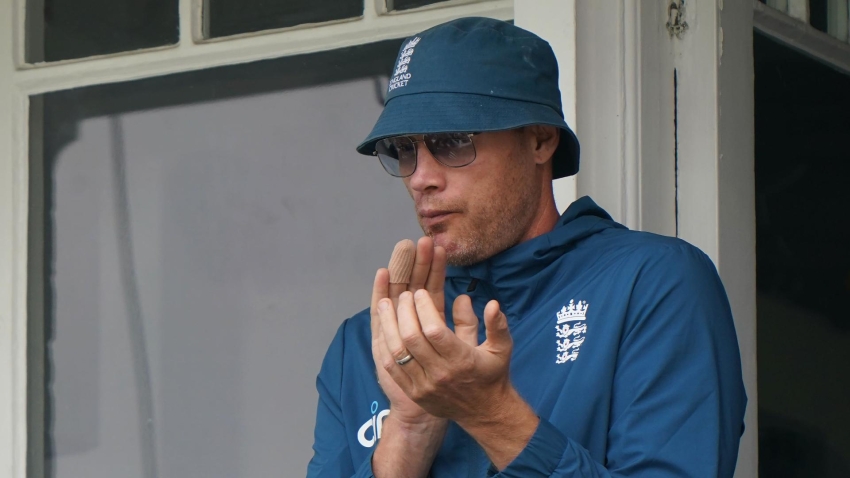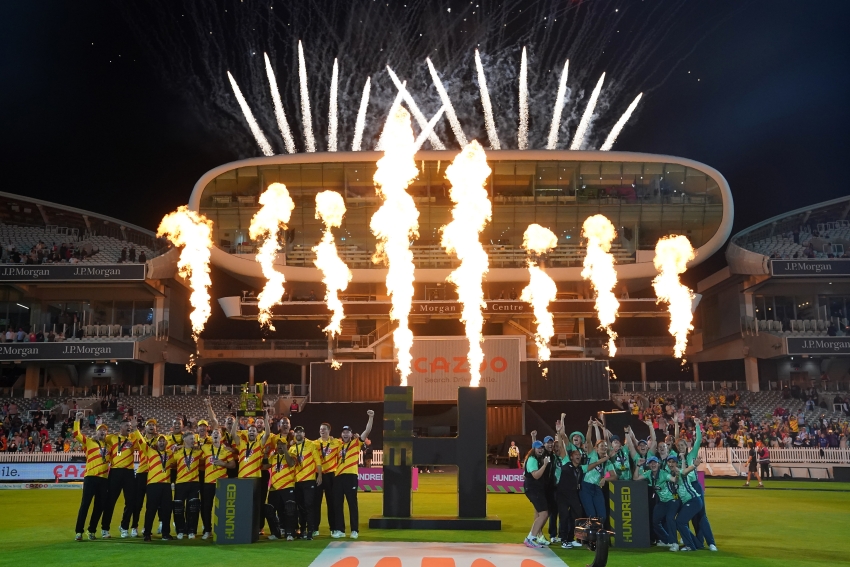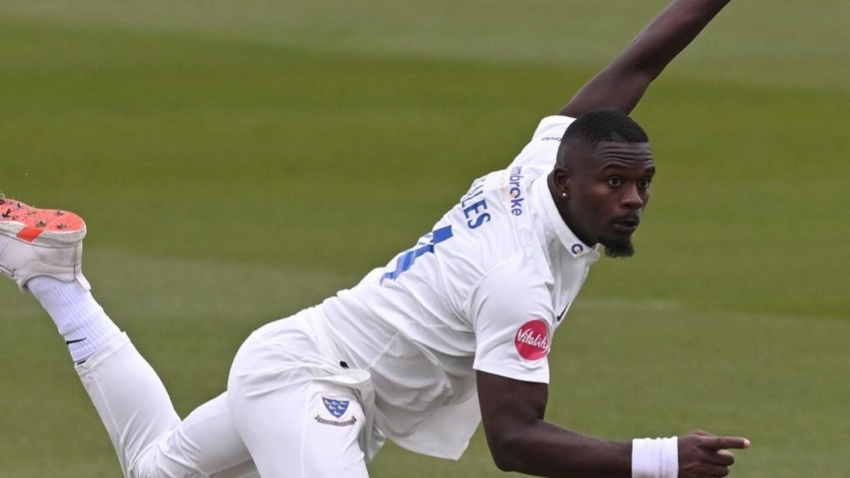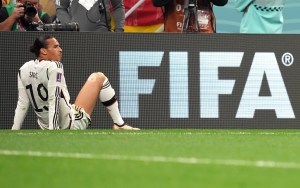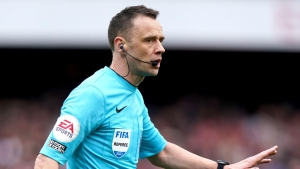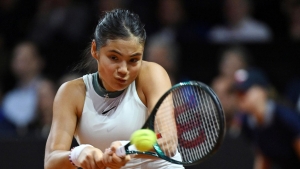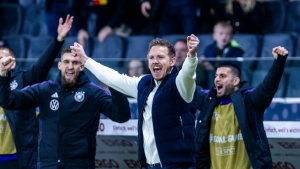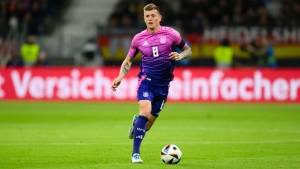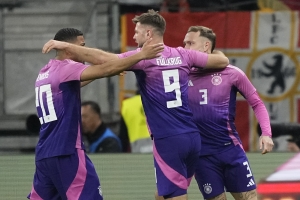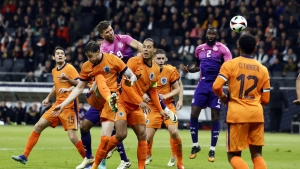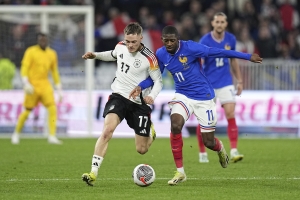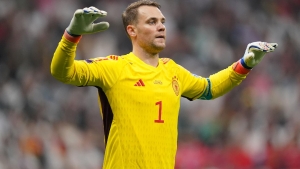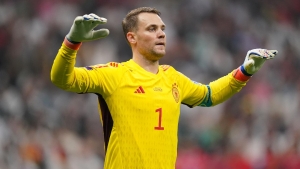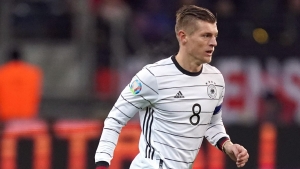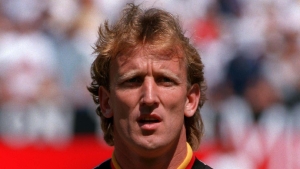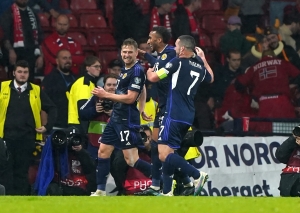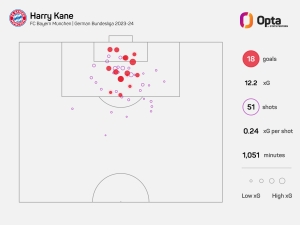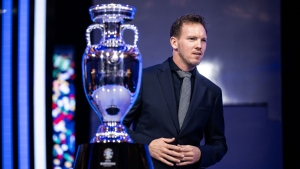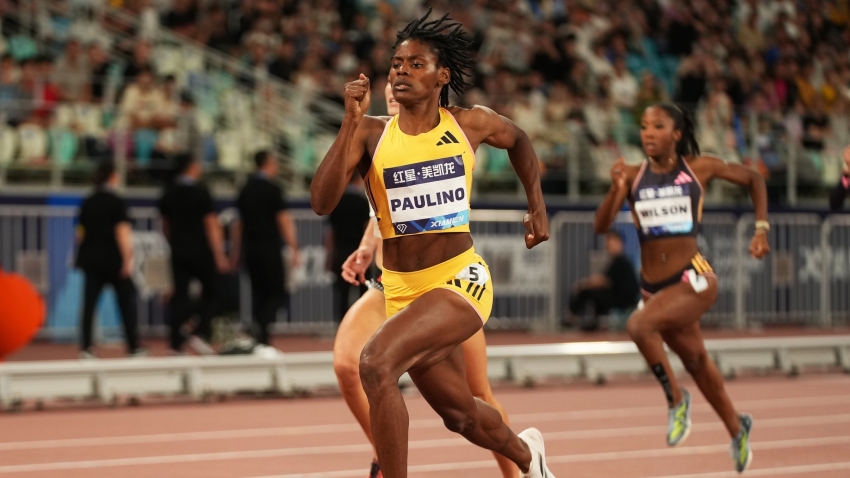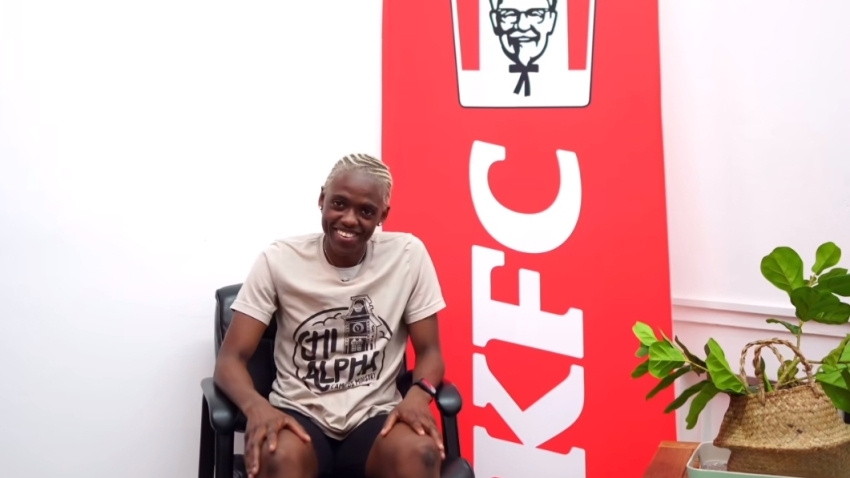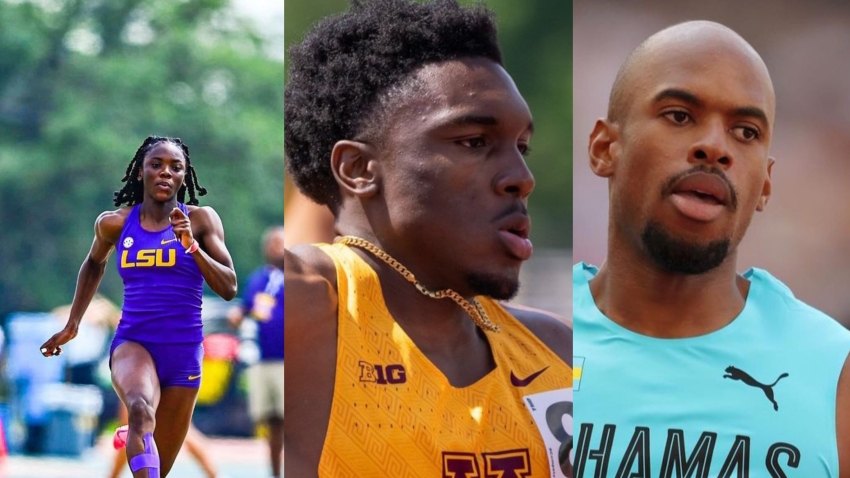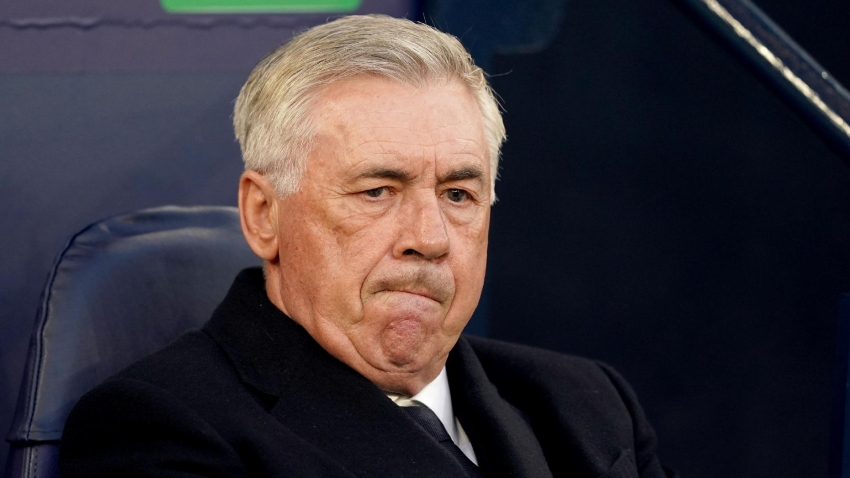German players are unlikely to make any major political statements at Euro 2024 after their World Cup protest in Qatar was met with a tepid domestic reception, ex-international Thomas Hitzlsperger has predicted.
Seven European nations at the 2022 global showpiece – including England – initially planned to wear ‘OneLove’ anti-discrimination armbands but were dissuaded following the threat of sporting sanctions from FIFA.
Instead, the Germans covered their mouths for a World Cup team photograph in protest, while the tournament remained overshadowed by the host nation’s record on human rights, from its treatment of migrant workers to the criminalisation of same-sex relationships.
Hitzlsperger, who bookended his playing career with spells at Aston Villa and Everton and a decade ago became the first former Premier League player to come out as gay, said: “It ended for the German team not in a good way. Funnily enough, back home a lot of people criticised it whereas abroad it was seen as a big statement.
“After the tournament, some of the representatives of the German national team just said, ‘look, at the Euros we talk about football, nothing else’. So I don’t expect much from the team similar to the World Cup.
“I think the England team were the first ones to play, and they decided against the One Love armband. A lot of the German players, they felt a responsibility, they felt ‘we’ve got to make a statement’.
“They couldn’t rely on the other teams. I think there were seven teams in the end that tried to stick together and wear the armband, and then they all collapsed, basically. And that’s when the Germans were like, ‘We still have to do something’.”
The former midfielder, who is now serving as an ambassador for this summer’s tournament in his home country, agrees that Germany’s poor showing likely influenced negative sentiment around the protest.
He said: “Football can be brutal. If you win, you set the tone and whatever you do it’s accepted and people look up to you. If you don’t win, you lose football matches, then you better not say anything.”
Even before the tournament, said the 42-year-old, the German public was already divided over whether or not the national team – or anyone – had a responsibility to act.
“It was a very difficult debate and it never came to a conclusion,” said Hitzlsperger.
“Some said it’s too much politics, others said it was right what we did, and that’s where we ended. That was our opportunity to say ‘we’re hosting a European Championship, let’s have a really good time together’, talk about responsibility when it comes to sustainability but don’t teach the world what to do.”
Organisers hope the tournament itself will instead do the talking, with ambitions to become be the most sustainable European Championship of all time through the use of entirely pre-existing stadia run by 100 per cent renewable energy sources, a zoned match schedule reducing travel distances for teams and fans, and the creation of a climate fund dedicated to projects focused on mitigating tournament-related unavoidable emissions.
It is also the second major football tournament, following in the footsteps of last summer’s Women’s World Cup, to sign a human rights declaration.
UEFA has stated EURO 2024 “embraces gender identities and expressions as a spectrum that is not limited to a binary concept”, with gender-neutral toilets available at all venues and similarly neutral lanes outside the stadia to accommodate a range of gender expressions for procedures like body checks.
Ultimately, says Hitzlsperger, “the German FA, UEFA, the German government and the foreign ministry, (will do) everything we can do, without putting the team under too much pressure to say ‘every game you have to make a statement’.
“You have to know who is responsible for what, and unfortunately what happened in Qatar really made the players aware of the consequences if you take a stance on human rights.”
Stuart Attwell will be one of the VARs at this summer’s European Championship in Germany, with Anthony Taylor among the on-field referees.
The news comes two days on from the pair being on duty for Nottingham Forest’s 2-0 loss at Everton, after which the officiating was attacked in a social media post from the visitors that referenced Attwell being “a Luton fan”.
The post said there had been “three extremely poor decisions – three penalties not given – which we simply cannot accept”, adding: “We warned the PGMOL (Professional Game Match Officials Limited) that the VAR is a Luton fan before the game, but they didn’t change him.”
On Monday, Forest said they had submitted a formal request to PGMOL for audio of discussions between Attwell and Taylor in relation to the three incidents to be made public.
They also called on PGMOL to change its rules on officials’ allegiances “to account for contextual rivalries in the league table’, not just local rivalries”.
Three Forest members of staff – boss Nuno Espirito Santo, referee analyst Mark Clattenburg and full-back Neco Williams – have been asked by the Football Association for their observations following comments they made after the match at Goodison Park, while the Premier League is examining the club’s social media post.
As well as Taylor, with assistants Gary Beswick and Adam Nunn, Michael Oliver will be the other English on-field referee at the Euros, assisted by Stuart Burt and Dan Cook, UEFA said on Tuesday. The other English VAR alongside Attwell will be David Coote.
Emma Raducanu says the best is yet to come as she continued her excellent form by making it through to the quarter-final of the Stuttgart Open.
The 2021 US Open champion beat Linda Noskova 6-0 7-5 in Germany to set up a mouth-watering last-eight tie with world number one Iga Swiatek on Friday.
Raducanu is making her way back after a torrid 2023 but looked excellent in winning her two ties in the Billie Jean King Cup at the weekend and then followed that up by swatting home favourite Angelique Kerber aside in Wednesday’s first round.
She stepped it up again to dispose of the world number 31 to set up a repeat of the 2022 quarter-final with Swiatek.
Despite all her troubles since winning the US Open in 2021, Raducanu never doubted the good times would return.
“I am not too surprised because I have been working really hard on the training court and I knew it was just a matter of time,” she said in her on-court interview.
“This isn’t my best I still have a long way to go. I am just really happy the rewards are starting to come on the match court.
“You know how it is when you are training day in, day out you feel like the results aren’t going your way. It is never that far away, that is something I am learning.
“Going through everything I have been through gives you a different appreciation, there is nothing like playing in front of fans and playing good tennis.”
Her progress will face its toughest test when against the Polish world number one, who is a master of the clay court, but the Briton knows she is not under any pressure.
Raducanu, whose world ranking of 303 will shoot up, added: “We played here two years ago in the quarters, I have come a long way in two years, and she has achieved a lot, I have nothing to lose, I can swing and enjoy it.
“Hopefully recover in time. I’m good.”
Bayern Munich may always have an "attraction" to coaches but Carsten Ramelow does not expect Germany boss Julian Nagelsmann to return to the Bundesliga giants.
Nagelsmann was dismissed from his role as Bayern coach back in March 2023, as his former side were trying to make ground on Borussia Dortmund in the Bundesliga title race.
Thomas Tuchel was swiftly appointed as his replacement, leading the club to an 11th straight top-flight title last term, but the former Chelsea boss has failed to live up to expectations this season, and will leave at the end of the campaign.
Xabi Alonso rebuffed Bayern's interest to stay at Bayer Leverkusen, and it remains to be seen who the Bundesliga giants will go for as Tuchel's replacement.
Nagelsmann is preparing to lead Germany at Euro 2024, which they will host from June 14, and former international Ramelow cannot see him being enticed back to his old club.
"Quite honestly, it's hard for me to imagine that," Ramelow told Stats Perform when asked about Nagelsmann reuniting with Bayern.
"I would be surprised. First, he was sacked at Bayern, then he got the chance to coach Germany and now he should return.
"I think he will stay as Germany head coach. I also think that Bayern has different ideas, so let's be surprised by what they do over the next months."
Nagelsmann oversaw back-to-back friendly victories over France and Netherlands as Germany impressed in the March internationals.
Meanwhile, Tuchel's Bayern are almost out of the running for the Bundesliga title but will hope to reach the Champions League semi-final when Arsenal return to Germany for their finely poised last-eight tie.
Ramelow acknowledged that Bayern remain an attractive proposition for any coach, however.
"I mean everything is possible, sure," he added. "But I think that Nagelsmann has his own ideas and you don't take over as a national team's head coach only for a few months.
"Even though Bayern always has its attraction. But he coached them already and they had their reasons to sack him, so, I would be surprised."
Germany start their Euro 2024 campaign against Scotland at Allianz Arena on June 14, after friendlies against Ukraine and Greece to warm up for the tournament.
Toni Kroos' comeback from international retirement started with two impressive results but Carsten Ramelow remains "sceptical" over Germany's Euro 2024 hopes.
Real Madrid midfielder Kroos reversed his decision to retire from Julian Nagelsmann's national team, returning in March before back-to-back victories over France and Netherlands.
In doing so, the 34-year-old – who had not played on the international stage for three years prior – equalled Jurgen Klinsmann's 108-match tally, with only seven players now having more appearances for Germany.
Kroos was an integral figure in Nagelsmann's midfield as the Euro 2024 hosts swept aside France 2-0 in a Lyon friendly before overcoming Netherlands 2-1 in a Frankfurt meeting.
Yet former Germany midfielder Ramelow remains unsure whether Nagelsmann's side will hit similar heights when it comes to hosting the European Championships in June.
"I don't know what happened with the team in the March games but the results were good," former Bayer Leverkusen player Ramelow told Stats Perform.
"In Germany, you now tend to say we will win the Euros… We also play at home, so we are European Champions already – that's always interesting how the media sees this.
"The positive things were the recent results and the performances of the national team. They have improved drastically, also the overall mentality.
"Whether it was the impact of Toni Kroos, we will see. He is a player that has held a very high level over the years with Real Madrid, no doubt.
"He can definitely help the team, but whether that is something for the future remains to be seen. I am still sceptical because we had many years where nothing worked and two games where they played well."
Ramelow was at least pleased to see Germany find basics such as "passion, heart and commitment" in the friendly victories, though insists time will tell on their success and Kroos' performances.
"[The results] also created euphoria, which is good," the versatile 46-cap Germany defender added. "But in the end, we have to wait for the tournament to start.
"Then we will see if all of that still works between Toni Kroos and the rest of the team. I think it's too early to claim we are back on track and will play a successful tournament.
"Regarding Toni Kroos, I also have to say I was a bit surprised about his comeback, because they attempted to start all over again."
Germany start their Euro 2024 campaign against Scotland on June 14, though Kroos and his team will face Ukraine and Greece in friendlies before that tournament opener at the Allianz Arena.
Germany recover from early setback to sink Netherlands
March 26, 2024Niclas Fullkrug snatched a scrappy winner as Germany defeated the Netherlands 2-1 to complete a promising international break for Julian Nagelsmann’s side.
Having seen off France 2-0 on Saturday, the Euro 2024 hosts added another notch on their belt in Frankfurt.
They had to come from behind to take out Ronald Koeman’s men, who took a fourth-minute lead through Joey Veerman. Maximilian Mittelstadt responded with a sweetly-struck effort from a corner routine and both teams had chances to take the lead before Germany snatched the win five minutes from time.
It was far from a clean finish, substitute Fullkrug steering the ball towards the far post and marginally over the line as Bart Verbruggen scrambled to make a save rendered moot by VAR.
The visitors grabbed the lead with their first meaningful break into opposition territory, Memphis Depay spotting the chance to open the door.
He spotted Veerman’s run and picked his pass, with the PSV Eindhoven collecting the ball and slotting home carefully for his first international goal.
The early setback could have knocked the home side off course but instead they got themselves back on level terms in quick time. Mittelstadt, fresh from an encouraging debut against Les Bleus, showed no trace of reticence as he collected a short corner from Toni Kroos and bent an ambitious strike handsomely into the top corner.
Having restored parity, Germany soon looked the sharper side but when Ilkay Gundogan and Robert Andrich took the chance to pull the trigger their efforts failed to worry Verbruggen.
Netherlands’ Wout Weghorst, left, celebrates with his team-mate Joey (Peter Dejong/AP)
The Dutch absorbed plenty of pressure before going close at the other end, Mathias de Ligt glancing Daley Blind’s ball across goal as Donyell Malen failed to apply the finishing touch.
Germany had controlled most of the first half but looked vulnerable again five minutes into the second, Malen this time getting a solid connection but still unable to beat Marc-Andre ter Stegen.
Koeman’s side continued to grow, winning a handy free-kick that Blind squandered and then working Tijani Reijinders into a good position which came to nothing as he cleared the crossbar.
The game was open enough for either side to make a decisive move but chances continued to come and go. With an hour gone Depay missed from close range after a smart recovery from Malen and Mittelstadt’s hopes of adding a second were ended by Verbruggen’s near-post stop.
As the substitutes began to flow, Chris Fuhrich stood out from the crowd with a dashing run through the visiting defence and a through-ball that just escaped Kai Havertz.
Jamal Musiala and Thomas Muller kept the Netherlands pinned back with efforts on goal and Verbruggen’s resistance was finally ended when they Germans won it in scrappy fashion.
With five minutes remaining Fullkrug rose to meet Kroos’ corner, bundling the cross goalwards from 10 yards and just squeezing the ball over the line despite the goalkeeper clawing it back on the dive.
Germany's preparations for Euro 2024 stepped up another gear with a 2-1 victory over the Netherlands in Frankfurt.
Niclas Fullkrug was the matchwinner for Julian Nagelsmann's team, who had to come from behind following Joey Veerman's early opener.
Maximilian Mittelstadt’s error proved costly for that goal, but he responded with a stunning equaliser just seven minutes later.
That set the stage for substitute Fullkrug to write the headlines as he bundled in off his shoulder from Toni Kroos' 85th-minute corner.
The Netherlands took just four minutes to break the deadlock in the 46th chapter of their intense rivalry with Germany.
Veerman steered the visitors ahead at Deutsche Bank Park as he latched on to a superb Memphis Depay ball from the right, following the easy dispossession of a rather hapless Mittelstadt.
Instead of wallowing, Mittelstadt reacted brilliantly and on just his second cap for Die Mannschaft, struck the game's emphatic second goal, hammering in off the underside of the crossbar with a long-range strike.
Ilkay Gundogan was denied smartly by Bart Verbruggen down at the bottom left corner in the 18th minute, before Kai Havertz repeated the move in the 36th, only to be halted by the offside flag.
Donyell Malen missed a great chance to restore the Dutch's lead – Mathijs de Ligt headed down a lofted free-kick, yet in a clustered area, the Borussia Dortmund man could only nod over from six yards out.
Making just his fifth international appearance, Verbruggen made fine stops from Mittelstadt, Jamal Musiala and Thomas Muller as Germany prodded and probed throughout the second half, but the Netherlands goalkeeper was finally beaten late on.
Kroos' left-sided corner dropped on the edge of the six-yard box, where Fullkrug managed to meet it with his shoulder. Verbruggen was unable to keep the ball from crossing the line, with the Netherlands' appeals for handball waved away.
Mittelstadt finds swift redemption
Mittelstadt's second Germany appearance could hardly have got off to a poorer start when he slipped up for the Netherlands' opener.
Yet the Stuttgart man responded with a brilliant, curling left-footed strike from a Jamal Musiala lay-off, with his effort yielding a lowly expected goals value of just 0.02.
The left-back is hoping to make a good impression and force his way into the reckoning for Euro 2024, so atoning for an error with a wondergoal should go some distance to proving he is worthy of being cut some leeway.
Complimentary Kroos matches Klinsmann
Kroos started in Frankfurt to claim his 108th international cap, equalling Jurgen Klinsmann's record tally. Impressively, only seven players have played more games for the DFB team, and Kroos was crucial in setting the tempo for his side.
Having retired after Germany's Euro 2020 exit, Kroos returned to feature in this camp, and he added a composure to the line-up that has too often been missing since he bowed out of the international picture. In the first half, he dictated the flow, completing 67 passes, with a near-perfect 97.3 percent pass completion rate.
The 34-year-old topped off his record-matching appearance with an assist for the winner.
Florian Wirtz scored after just seven seconds as Germany grabbed a surprise 2-0 friendly win over France in Lyon.
The 20-year-old Bayer Leverkusen forward struck moments after kick-off as the Euro 2024 hosts stunned the tournament favourites.
There was also an immediate assist for Toni Kroos, back in a Germany shirt three years after announcing his international retirement.
Straight from the whistle, the 34-year-old chipped the ball forward to Wirtz, who had darted to midway inside the France half.
Wirtz controlled the ball, took two more touches as he strolled forward before lashing his shot home from 20 yards.
It was the youngster’s first goal for his country and would have been the fastest international goal on record had Austria’s Christoph Baumgartner not opened the scoring after six seconds in his country’s friendly against Slovakia earlier on Saturday.
The previous quickest was Lukas Podolski’s strike for Germany against Ecuador in 2013.
France dominated the rest of the first half but Marcus Thuram side-footed their first decent chance over the crossbar from the edge of the box.
Kylian Mbappe then brought down a cross in the area only to shank his shot wide, before Aurelien Tchouameni skied a cross from Ousmane Dembele.
But Germany made it to half-time in front and promptly doubled their lead three minutes into the second half.
Wirtz turned provider, lifting the ball into the path of Jamal Musiala, who drove diagonally round France goalkeeper Brice Samba.
The Bayern Munich winger reached the byline before pulling the ball back for Arsenal forward Havertz to slot in his 15th international goal.
Mbappe, enduring a quiet evening, got himself booked after a tussle with Robert Andrich before firing an ambitious shot wide.
Stuttgart defender Maximilian Mittelstadt almost made it a debut to remember 10 minutes from full-time when he strode forward and fired goalwards.
His shot looked destined to nestle inside the far post until Samba stretched to get a fingertip to the ball and divert it wide.
Samba also denied Thomas Muller with a fine one-handed save after the substitute shot from 14 yards.
Mittelstadt was spared a comical own goal late on by a goal-line clearance from Antonio Rudiger, who sliced the ball onto his own crossbar to cap an ultimately disappointing night for the French.
Germany boss Julian Nagelsmann insisted Manuel Neuer remained his first-choice goalkeeper for Euro 2024 as he revealed another injury setback for the Bayern Munich man.
Neuer has not played an international match since his country’s dismal 2022 World Cup campaign.
The 37-year-old broke his leg while skiing shortly after returning from Qatar and will now miss Saturday’s friendly with France and next week’s clash with the Netherlands due to a minor leg injury suffered in training.
Nagelsmann expects Neuer, who has become a doubt for Bayern’s Champions League quarter-final first leg at Arsenal on April 9, to be sidelined for at least 10 days.
Asked if the keeper’s recent injury record had forced a rethink ahead of this summer’s European Championship – which Germany will host – the head coach told a press conference: “The decision has been made.”
Nagelsmann has already informed Neuer, who has 117 caps and was part of Germany’s 2014 World Cup winning team, and deputy Marc-Andre Ter Stegen of his choice.
Barcelona keeper Ter Stegen will start this weekend’s clash with Les Bleus in Lyon and on Tuesday when the Dutch visit Frankfurt.
Fulham’s Bernd Leno and uncapped Hoffenheim goalkeeper Oliver Baumann were also included in the 26-man squad named by Nagelsmann last week.
“Neuer got injured, but it’s just a small tear,” said Nagelsmann. “He won’t be away from the sport for eight months.
“It will be just 10 days and then he’ll have the possibility of returning.
“We are lucky to have a second goalkeeper of exceptional quality who will be able to play two matches.”
Neuer missed almost a year of football after suffering the serious leg injury following Germany’s group-stage World Cup exit in the Middle East.
He returned to action in October and has made 24 appearances for Bayern this term.
Bayern Munich captain Manuel Neuer has been ruled out of Germany’s upcoming friendlies against France and the Netherlands due to injury.
Neuer was absent from all of his country’s matches last year because of a broken leg but German media has reported the 37-year-old remains Julian Nagelsmann’s first-choice goalkeeper ahead of Euro 2024.
However, he has withdrawn from the final two tune-ups – against France in Lyon on Saturday and the visit of the Netherlands in Frankfurt next Tuesday – before Nagelsmann names his squad for the tournament.
A brief statement on the German national team’s official website said: “Manuel Neuer has left the German national team early and will be out of the two upcoming international matches against France and the Netherlands.
“The FC Bayern Munich goalkeeper and 2014 world champion left the team’s headquarters in Gravenbruch near Frankfurt due to a torn muscle fibre in his left adductor. He sustained the injury in training on Wednesday morning.”
Neuer earned the last of his 117 national team caps in Germany’s final group stage match at the 2022 World Cup – a 4-2 win over Costa Rica.
Toni Kroos back in Germany squad after retirement reversal
March 14, 2024Toni Kroos has been recalled to the Germany squad after an absence of almost three years, the country’s football association has announced.
The Real Madrid midfielder revealed last month he was planning to come out of international retirement.
The 34-year-old made himself unavailable for selection after Germany’s elimination from the delayed Euro 2020 tournament but has reversed his decision following talks with new coach Julian Nagelsmann.
Former Bayern Munich boss Nagelsmann, who took charge of the national side last September, has included Kroos in a 26-man squad for friendlies against France and the Netherlands later this month.
This would indicate Kroos, who has 106 international caps and won the World Cup in 2014, is now in the picture for this summer’s European Championship.
Veteran goalkeeper Manuel Neuer, the former Germany captain, has also been recalled for the first time since breaking his leg in a skiing accident in December 2022.
Germany World Cup winner Andreas Brehme dies aged 63
February 20, 2024Andreas Brehme, who scored the winning goal for West Germany in the 1990 World Cup final, has died aged 63.
The defender scored from the penalty spot late on to give his country a 1-0 win over Argentina in Rome.
He played for Bayern Munich and Kaiserslautern, winning the Bundesliga with both and also lifted the Serie A title with Inter Milan.
Bayern said the former left-back will be remembered as a “very special person”.
The club posted on X: “FC Bayern is deeply shocked by the sudden death of Andreas Brehme. The German record champion is united in mourning with his relatives and friends.
“We will always keep Andreas Brehme in our hearts – as a world champion and even more so as a very special person. He will always be part of the FC Bayern family. Rest in peace, dear Andi!”
Scotland boss Steve Clarke will not underestimate Germany at Euro 2024
December 03, 2023Scotland boss Steve Clarke is reading nothing into Germany’s struggles heading into Euro 2024, warning the tournament hosts are “always on it” when it comes to major finals.
Scotland will have the eyes of the continent on them on June 14 next year when they take on Germany in the tournament’s opening match in Munich.
Germany failed to get out of their group at the World Cup in Qatar, with a 2-1 defeat to Japan contributing to their exit. A 4-1 loss to the same opponents in a friendly in September cost Hansi Flick his job.
Results have been mixed since, with former Bayern Munich coach Julian Nagelsmann succeeding Flick at the helm.
But Clarke does not see Germany as a vulnerable opponent in any way, shape or form. They are three-time Euro winners with a further four World Cup titles to boot.
“When Germany get to the finals of a major tournament they are always on it,” Clarke told the PA news agency.
“I don’t think it will be a poor Germany team, I think it will be a very, very good Germany side.”
Clarke’s team are also up against Hungary and Switzerland in Group A, as they aim to become the first Scotland side to go beyond the first stage of a finals tournament.
“The first thing for us to do is just to prepare properly,” Clarke said.
“Make sure we’re competitive, play as well as we can in the games and then after that we’ll count on the points and see if we’ve got enough.”
Clarke’s team qualified with two matches to spare, finishing second in their group behind Spain but ahead of a Norway side infused with the star quality of Erling Haaland and Martin Odegaard.
“I think what impressed me most about this group of players (in qualification) is that they want to be competitive every time they go out there,” he said.
“We want to continue to improve – they feel as though they can improve a little bit more and hopefully between now and next summer, we do improve and we can be very competitive in Germany.”
With Saturday's Euro 2024 group-stage draw done and dusted, Europe's elite know what awaits them in Germany next year and all eyes will turn to the opening game in Munich on June 14.
Steve Clarke's Scotland will be Germany's first opponents as they kickstart their bid to become the first sole host nation to win the tournament since France in 1984.
Elsewhere, England can be content with a somewhat kind draw as Jude Bellingham, Harry Kane and company look to bring football home, while Group B looks set to earn the title of 'group of death', with defending champions Italy pitted against Spain and Croatia.
As fans across the continent begin plotting their nations' routes to the final, to be held in Berlin on July 14, Stats Perform runs through the best facts and figures from each of the six groups.
Group A: Germany, Hungary, Scotland, Switzerland
Germany have endured a troubled build-up to their home tournament, with Julian Nagelsmann parachuted in after the dismissal of Hansi Flick in September. The last Germany boss to win a major tournament at his first attempt was Jupp Derwall, who led the team (then West Germany) to Euro 1980 glory.
They will face a familiar foe in the form of Switzerland, who they will meet for the 54th time in senior internationals – no other team has faced Germany as often, but the teams have never met at the Euros before.
Germany's matchday one opponents will be Scotland, who will be making their fourth appearance at the Euros after also qualifying in 1992, 1996 and 2020. They have never reached the knockout stages.
However, they may fancy their chances of edging out Switzerland and Hungary in what could be a battle for second place this time around. Hungary took bronze when they first appeared at the Euros in 1964, but they have only won one of their nine games at the tournament since then (four draws, four defeats), beating Austria in the 2016 group stage.
Group B: Spain, Albania, Croatia, Italy)
All eyes will be on Group B ahead of the tournament, with three-time winners Spain drawn alongside defending champions Italy – who they beat in the 2012 final – and 2022 World Cup bronze medallists Croatia.
Excluding penalty shoot-outs, La Roja have only lost two of their last 22 matches at the Euros, winning 13 and drawing seven. The last two teams to beat them? Croatia and Italy in 2016.
Spain are the only nation to win back-to-back editions of the Euros, doing so in 2008 and 2012. Luciano Spalletti's Italy are looking to replicate that feat, having inched past Ukraine to claim second place in their qualification group.
The Azzurri have now qualified for eight successive editions of the tournament, though this is the first time they have reached a major competition while losing two or more games in their qualifying group, having been beaten home and away by England.
While Spain and Italy will feel unfortunate to have landed in such a difficult group, the omens are good for teams that face Croatia when it matters. They have lost to the eventual winners at four of their last six major tournaments, being beaten by Spain at Euro 2012, Portugal at Euro 2016, France at the 2018 World Cup, and Argentina in Qatar last year.
GROUP C: England, Denmark, Slovenia, Serbia
Gareth Southgate may be relieved to have avoided some of the heavy hitters with England landing in Group C, where they will start against Serbia on June 16 before taking on Denmark and Slovenia.
England's rematch with Denmark – who they beat in the Euro 2020 semi-finals – could be decisive in the battle for top spot. The Three Lions are unbeaten in all three of their meetings with Denmark at Euros/World Cups (two wins, one draw), with Switzerland the only team they have faced as often at tournaments without ever losing.
With Kane thriving at Bayern Munich and Bellingham a former star at Borussia Dortmund, two of the Three Lions' star players are no strangers to German turf.
They also have an excellent record against Slovenia, winning five and drawing one of the teams' six all-time meetings. The only one of those games to take place at a major tournament came at the 2010 World Cup, when Jermain Defoe hit the winner in a 1-0 victory for Fabio Capello's team.
Serbia, meanwhile, will be featuring at the Euros for the first time as an independent nation. They competed as Yugoslavia or FR Yugoslavia in five editions, finishing as runners-up in 1960 and 1968.
Group D: France, Austria, Netherlands, play-off winner A
With Kylian Mbappe spearheading their star-studded team, France head to the Euros among the favourites. Boss Didier Deschamps captained his country to glory at Euro 2000, and he could become the first person to win the competition as both a player and a head coach.
Les Bleus, however, face a tough set of opponents in Group D, none more so than the Netherlands.
France have faced the Oranje more often at the Euros without ever winning than they have any other side, losing their last two such matches against them at the 2000 and 2008 tournaments.
Ronald Koeman might be pleased to see his team drawn alongside Austria, with the Netherlands winning their last seven matches against them, averaging 2.9 goals per game throughout that run (20 in total).
The final team in Group D will be decided via the play-offs in March, with Wales, Finland, Poland and Estonia vying for a ticket to Germany. France have met any of those nations at the Euros.
Group E: Belgium, Romania, Slovakia, play-off winner B
Belgium headline Group E, with Domenico Tedesco at the wheel as the last members of the Red Devils' so-called golden generation look to finally deliver on their promise.
Since losing to West Germany in the final of Euro 1980, Belgium have never reached the semi-finals of the tournament, being knocked out in the last eight at each of the last two editions – versus Wales in 2016 and Italy at Euro 2020.
They will be content with a kind-looking draw, with Romania the team drawn into Group E from pot two. Their win ratio of just six per cent at the Euros is the worst of any nation to qualify for more than one edition, winning just once in 16 games at the tournament.
Slovakia, meanwhile, have only won two of their seven games at Euro tournaments (one draw, four defeats), also failing to score in four of their last five games.
Ukraine, Israel, Bosnia and Herzegovina and Iceland will battle for the final spot in this group in March.
GROUP F: Portugal, Turkiye, Czech Republic, play-off winner C
Group F contains 2016 winners Portugal, the only team to reach the knockout stages of the last seven editions of the Euros, a run that stretches back to the 1996 tournament. In fact, they have always progressed from the group stages in their eight previous appearances at the Euros.
Cristiano Ronaldo seems set to be sticking around for this tournament. He will be 39 by the time it rolls around. The Al Nassr attacker holds the records for most games (25) and most goals (14) at the Euros, has also managed a joint-record six assists (since records began in 1972).
Ronaldo's 20 total goal involvements at the Euros are twice as many as any other player since assist records began, with Michel Platini second on 10 (nine goals, one assist).
Roberto Martinez's team open their campaign against the Czech Republic, who are featuring at an eighth successive edition of the Euros (including appearances as Czechoslovakia). Only Germany (14) and France (nine) are currently on longer runs of consecutive appearances.
One of Georgia, Greece, Kazakhstan and Luxembourg will join Turkiye in rounding out the group. They are looking to improve on their dismal showing at Euro 2020, and have qualified for three successive editions of the Euros for the first time. However, they have lost six of their last seven matches at the tournament (one win).
Germany coach Julian Nagelsmann was relieved to see the Euro 2024 hosts avoid the dreaded 'group of death' at Saturday's draw, but he will not be taking their opponents lightly.
As tournament hosts, Germany were placed into Group A, being joined by Hungary, Scotland and Switzerland.
Germany will face Scotland in the tournament's opening game in Munich on June 14, before taking on Hungary in Stuttgart five days later and rounding off their group against the Swiss in Frankfurt on June 23.
With the likes of Italy, Croatia and the Netherlands lurking outside pot one, Nagelsmann acknowledged Germany could have received a more difficult draw, though he thinks Scotland will pose a particular challenge after impressing in qualifying.
"I think it’s a very interesting group," the former Bayern Munich boss told ZDF.
"The opening game against Scotland will of course be emotional. They have great fans, it will be a nice start in Munich.
"Hungary and Switzerland also have some Bundesliga players, and I've been able to train some of them myself, I know a few players there. There are a few exciting duels.
"We let the emotions out when the games start, we don't talk too much beforehand, but we have a path that we want to take.
"It's an interesting group in which we want to assert ourselves, that's clear.
"It's not a group of death, but there are no really bad opponents if you look at the qualifying rounds. The teams have all left better-rated names behind them."
Rudi Voller, the 1990 World Cup-winning striker who became Germany's national team director in February, echoed Nagelsmann's thoughts after the draw was completed.
"I'll be honest, there were scenarios with Italy and the Dutch," he said. "If you get into a group with them, it's the so-called group of death. We were spared that.
"But we are not in a situation where we disrespect any opponents or take them lightly. Those times are over.
"It's challenging, but I'm especially looking forward to the opening game against the Scots. These are wonderful games. With their fans, who will definitely come to the opening game, it is an honour."

